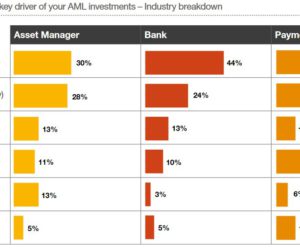By Dan Byrne for AMLi
SOME OF THE BIGGEST global banks are sceptical of doing business in the Middle East because of evolving AML trends, an industry expert has said.
Correspondent banking and trade financing are sub-sectors that are especially vulnerable, she claimed – enough to ensure a “daily fear that Middle Eastern institutions are being excluded from the financial system.”
The comments were made by Danyelle Gerges, regional director at the Financial Services Volunteer Corps for Jordan, Lebanon and the UAE.
She warned of a trend developing in global finance; to reduce or even sever ties with peers in the Middle East over risk fears.
“A recent survey in 17 Arab countries found that 40% of banks have experienced a decline in correspondent banking business,” she told attendees at FFECON Week. “To keep reputations afloat, some institutions tend to cut business with certain clients completely.”
“There is a risk that unregulated sectors are going to be driven further underground as a result,” she added.
Gerges recognised that key variations in common practice had led to significant and frequent challenges for adapting international AML frameworks for the region.
Examples often came down to simple information like client names and dates of birth, and the ways they were stored and processed.
“The convention of first name – middle name – last name is used for know-your-customer and politically exposed persons (PEPs),” she explained. “In the Middle East… countries vary in the number of names, and the translation from Arabic to English leads to changes.”
“Also, we have about 150 million Muhammads in the world which leads to many false positives,” she said. “A recent survey found that 34% of Middle Eastern financial institutions routinely generate false positives, that’s a huge number.”
Among other issues challenges in the region were the widespread use of PO boxes – often deemed insufficient in thorough risk assessment – and birthdays not being accurate.
According to Gerges, there are higher instances of people in the region being born without a birth certificate, and when it comes to getting an official ID, they will simply list ‘1st January’ and the year for simplicity.
“Variations on names and date of birth is something that no financial institution will be able to resolve by itself,” said Aamir Hanif of online payments company Stripe. “It’s just a cultural factor in the Middle East.”
He called for institutions to be able to guarantee broader info when risk-screening.
“You need to be able to say to authorities, ‘not only do I know what info the customer provided at onboarding, but I can tell you what they’re up to now too,’ – that’s essential in an environment like the Middle East,” he said.
Share this on:
Follow us on:








